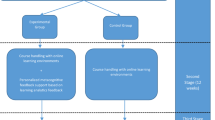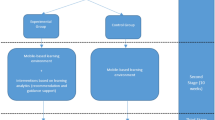Abstract
This research examined the effect of learning analytics (LA) on students’ metacognitive awareness and academic achievement in an online learning environment. In this study, a mixed methods approach was used and applied as a quasi-experimental design. The results of LA were sent to students weekly in LA group (experimental group) via learning system. The LA was not sent to the non-LA group (control group). The quantitative data of the research were obtained through the metacognitive awareness inventory and academic achievement test used as pretest and posttest. A semi-structured student opinion form was used to find out the students' opinions about the learning environment and LA. The research was conducted within the scope of the Computing course and lasted 12 weeks. The results showed that LA assisted recommendations and guidance feedback had a significant effect on students' metacognitive awareness and academic achievement. The qualitative findings revealed that LA are useful for increasing participants’ metacognitive awareness and academic achievement. In line with the findings, various suggestions were made for instructors, instructional designers and researchers in the design and management of online learning environments.


Similar content being viewed by others
References
AECT (Association for Educational Communications and Technology). (2008). Definition. In A. Januszewski & M. Molenda (Eds.), Educational Technology: A Definition with Commentary. pp. 1–14. Lawrence Erlbaum Associates.
Akin, A., Abaci, R., & Cetin, B. (2007). The validity and reliability of the Turkish version of the metacognitive awareness inventory. Educational Sciences: Theory and Practice, 7(2), 671–678.
Allen, I. E., & Seaman, J. (2010). Class differences: Online education in the United States, 2010. Retrieved August 10, 2019, from http://sloanconsortium.org/sites/default/files/class_differences.pdf
Arnold, K. E., & Pistilli, M. D. (2012). Course signals at Purdue: Using learning analytics to increase student success. In Proceedings of the 2nd International Conference on Learning Analytics and Knowledge. pp. 267–270. ACM.
Baker, L., & Brown, A. L. (1984). Metacognitive skills and reading. In P. D. Pearson, R. Barr, & M. L. Kamil (Vol. Eds.), Handbook of Reading Research: Vol. 1, pp. 353– 394. Psychology Press.
Cho, V., Cheng, T. E., & Lai, W. J. (2009). The role of perceived user-interface design in continued usage intention of self-paced e-learning tools. Computers and Education, 53(2), 216–227. https://doi.org/10.1016/j.compedu.2009.01.014
Clow, D. (2013). An overview of learning analytics. Teaching in Higher Education, 18(6), 683–695. https://doi.org/10.1080/13562517.2013.827653
Cohen, J. (1988). Statistical power analysis for the behavioral sciences (2nd ed.). Erlbaum.
Derouin, R. E., Fritzsche, B. A., & Salas, E. (2005). E-learning in organizations. Journal of Management, 31(6), 920–940. https://doi.org/10.1177/0149206305279815
Duval, E. (2011). Attention please! Learning analytics for visualization and recommendation. In Proceedings of the 1st International Conference on Learning Analytics and Knowledge, LAK ’11. pp. 9–17. ACM.
Dyckhoff, A. L., Zielke, D., Bültmann, M., Chatti, M. A., & Schroeder, U. (2012). Design and implementation of a learning analytics toolkit for teachers. Journal of Educational Technology and Society, 15(3), 58–76.
Dyckhoff, A. L., Lukarov, V., Muslim, A., Chatti, M. A., & Schroeder, U. (2013, April). Supporting action research with learning analytics. In Proceedings of the Third International Conference on Learning Analytics and Knowledge. pp. 220–229. ACM
Elias, T. (2011). Learning analytics: definitions, process and potential. Retrieved August 10, 2019, from http://learninganalytics.net/LearningAnalyticsDefinitionsProcessesPotential.pdf
Ferguson, R. (2012). Learning analytics: Drivers, developments and challenges. International Journal of Technology Enhanced Learning, 4(5/6), 304–317. https://doi.org/10.1504/IJTEL.2012.051816
Fernández-Gallego, B., Lama, M., Vidal, J. C., & Mucientes, M. (2013). Learning analytics framework for educational virtual worlds. Procedia Computer Science, 25, 443–447. https://doi.org/10.1016/j.procs.2013.11.056
Giannakos, M. N., Sampson, D. G., & Kidziński, Ł. (2016). Introduction to smart learning analytics: Foundations and developments in video-based learning. Smart Learning Environments, 3(12), 1–9. https://doi.org/10.1186/s40561-016-0034-2
Jivet, I., Scheffel, M., Drachsler, H., & Specht, M. (2017, September). Awareness is not enough: pitfalls of learning analytics dashboards in the educational practice. In European Conference on Technology Enhanced Learning. pp. 82–96. Springer.
Johnson, M. W., & Barnes, T. (2010). EDM visualization tool: Watching students learn. In Proceedings of the 3rd International Conference on Educational Data Mining. pp. 297–298.
Karaoglan Yilmaz, F. G., Olpak, Y. Z., & Yilmaz, R. (2018). The effect of the metacognitive support via pedagogical agent on self-regulation skills. Journal of Educational Computing Research, 56(2), 159–180. https://doi.org/10.1177/0735633117707696
Karaoglan Yilmaz, F. G. (2020). Modeling different variables in flipped classrooms supported with learning analytics feedback. Journal of Information and Communication Technologies, 2(1), 1–16.
Karaoglan Yilmaz, F. G., & Yilmaz, R. (2020a). Learning analytics as a metacognitive tool to influence learner transactional distance and motivation in online learning environments. Innovations in Education and Teaching International. https://doi.org/10.1080/14703297.2020.1794928
Karaoglan Yilmaz, F. G., & Yilmaz, R. (2020b). Student opinions about personalized recommendation and feedback based on learning analytics. Technology, Knowledge and Learning, 25(4), 753–768. https://doi.org/10.1007/s10758-020-09460-8
Karaoglan Yilmaz, F. G. (2021). Utilizing learning analytics to support students’ academic self-efficacy and problem-solving skills. The Asia-Pacific Education Researcher. https://doi.org/10.1007/s40299-020-00548-4
Kerly, A., Ellis, R., & Bull, S. (2008). CALMsystem: A conversational agent for learner modelling. In R. Ellis, T. Allen, & M. Petridis (Eds.), Applications and innovations in intelligent systems XV (pp. 89–102). Springer.
Kloos, C.D., Pardo, A., Muñoz-Merino, P.J., Gutiérrez, I., & Leony, D. (2013). Learning analytics @ UC3M. 2013 IEEE Global Engineering Education Conference (EDUCON). Berlin, Germany.
Ma, J., Han, X., Yang, J., & Cheng, J. (2015). Examining the necessary condition for engagement in an online learning environment based on learning analytics approach: The role of the instructor. Internet and Higher Education, 24(2015), 26–34. https://doi.org/10.1016/j.iheduc.2014.09.005
Miles, M. B., & Huberman, A. M. (1994). Qualitative data analysis: An expanded sourcebook. Sage.
Moore, M. G., & Kearsley, G. (2011). Distance education: A systems view of online learning. Cengage Learning.
Nunnally, J. C. (1967). Psychometric theory. McGraw-Hill.
Park, Y., & Jo, I. H. (2015). Development of the learning analytics dashboard to support students’ learning performance. Journal of Universal Computer Science, 21(1), 110–133. https://doi.org/10.3217/jucs-021-01-0110
Peña-Ayala, A. (2014). Educational data mining: A survey and a data mining-based analysis of recent works. Expert Systems with Applications, 41(4, Part 1), 1432–1462. https://doi.org/10.1016/j.eswa.2013.08.042
Ribbe, E., & Bezenilla, M. J. (2013). Scaffolding learner autonomy in online university courses. Digital Education Review, 24, 98–113. https://doi.org/10.1344/der.2013.24.98-112
Ruipérez-Valiente, J. A., Muñoz-Merino, P. J., Leony, D., & Kloos, C. D. (2015). ALAS-KA: A learning analytics extension for better understanding the learning process in the Khan Academy platform. Computers in Human Behavior, 47(2015), 139–148. https://doi.org/10.1016/j.chb.2014.07.002
Sahin, M., & Yurdugul, H. (2019). An intervention engine design and development based on learning analytics: The intelligent intervention system (In 2 S). Smart Learning Environments, 6(1), 1–18. https://doi.org/10.1186/s40561-019-0100-7
Sahin, M., & Yurdugul, H. (2020). The framework of learning analytics for prevention, intervention, and postvention in e-learning environments. In D. Ifenthaler & D. Gibson (Eds.), Adoption of data analytics in higher education learning and teaching (pp. 53–69). Springer International Publishing.
Scheffel, M., Drachsler, H., Stoyanov, S., & Specht, M. (2014). Quality indicators for learning analytics. Journal of Educational Technology & Society, 17(4), 117–132.
Schraw, G., & Dennison, R. S. (1994). Assessing metacognitive awareness. Contemporary Educational Psychology, 19(4), 460–475. https://doi.org/10.1006/ceps.1994.1033
Siemens, G., & Long, P. (2011). Penetrating the fog: Analytics in learning and education. EDUCAUSE Review, 46(5), 30–32.
Siemens, G., & Gasevic, D. (2012). Guest editorial - learning and knowledge analytics. Educational Technology and Society, 15(3), 1–2.
Simpson, O. (2004). The impact on retention of interventions to support distance learning students. Open Learning: THe Journal of Open, Distance and e-Learning, 19(1), 79–95. https://doi.org/10.1080/0268051042000177863
Ustun, A. B. (2019). Effects of mobile learning in blended learning environments. Bilgi Ve İletişim Teknolojileri Dergisi/journal of Information and Communication Technologies, 1(1), 1–14.
Wright, M. C., McKay, T., Hershock, C., Miller, K., & Tritz, J. (2014). Better than expected: Using learning analytics to promote student success in gateway science. Change: the Magazine of Higher Learning, 46(1), 28–34. https://doi.org/10.1080/00091383.2014.867209
Van Laer, S., & Elen, J. (2019). The effect of cues for calibration on learners’ self-regulated learning through changes in learners’ learning behaviour and outcomes. Computers and Education, 135(2019), 30–48. https://doi.org/10.1016/j.compedu.2019.02.016
Verbert, K., Govaerts, S., Duval, E., Santos, J., Van Assche, F., Parra, G., & Klerkx, J. (2014). Learning dashboards: An overview and future research opportunities. Personal and Ubiquitous Computing, 18(6), 1499–1514. https://doi.org/10.1007/s00779-013-0751-2
Yilmaz, R. (2020). Enhancing community of inquiry and reflective thinking skills of undergraduates through using learning analytics-based process feedback. Journal of Computer Assisted Learning, 36(6), 909–921. https://doi.org/10.1111/jcal.12449
Yilmaz, F. G. K., Ustun, A. B., & Yilmaz, R. (2020). Investigation of pre-service teachers’ opinions on advantages and disadvantages of online formative assessment: An example of online multiple-choice exam. Journal of Teacher Education and Lifelong Learning, 2(1), 1–8.
Funding
The author declare that they have no funding of this study.
Author information
Authors and Affiliations
Corresponding author
Ethics declarations
Conflict of interest
The author declare that they have no conflict of interest.
Additional information
Publisher's Note
Springer Nature remains neutral with regard to jurisdictional claims in published maps and institutional affiliations.
Rights and permissions
About this article
Cite this article
Karaoglan Yilmaz, F. The effect of learning analytics assisted recommendations and guidance feedback on students’ metacognitive awareness and academic achievements. J Comput High Educ 34, 396–415 (2022). https://doi.org/10.1007/s12528-021-09304-z
Accepted:
Published:
Issue Date:
DOI: https://doi.org/10.1007/s12528-021-09304-z




